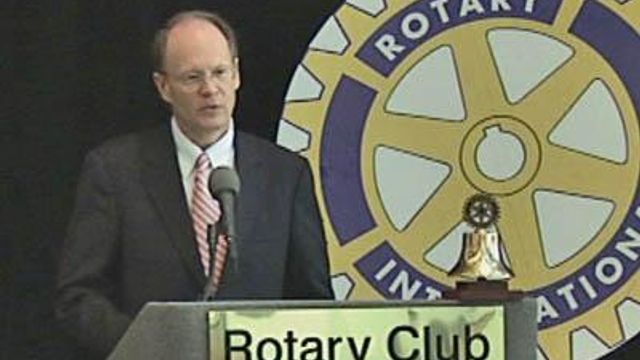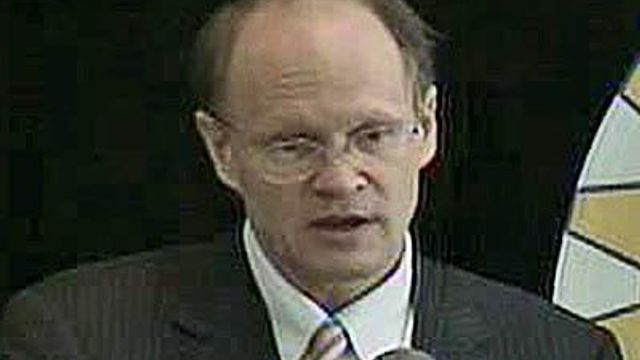Meeker: Water 'Budget' Needed to Get Through Drought
Mayor Charles Meeker on Monday called for establishing an overall "budget" for local water use and said the City Council would take steps in the coming weeks to ensure the city stays within it.
Posted — UpdatedMeeker noted that the drought gripping the state is in its 10th month – about twice as long as previous droughts. Yet, he said, it's difficult to tell how much response is needed locally to address the situation adequately.
"It's sort of like being in the second or third quarter of a basketball game ... but you don't know how many points it's going to take to win," he said. "We know we need to limit personal consumption. We know we need to get low-flow devices on. We know we need to put the Stage 2 restrictions in place. But we don't know if that's going to be enough."
The City Council last week voted to implement Stage 2 water restrictions this Friday, banning outdoor watering and pressure-washing and closing car washes that don't use a city-certified system to recycle their water. The council previously asked local residents to install low-flow devices on shower heads and faucets and to limit daily water use to 35 gallons per person.
The Army Corps of Engineers, which manages Falls Lake, issued a forecast last week that suggested the lake, which is Raleigh's primary source of drinking water, would run dry this summer. The forecast was based on current consumption rates and predictions of continued dry weather.
Meeker said he plans to set up a meeting with the City Council and Corps of Engineers managers to review the forecast and devise a plan to ensure the lake doesn't run dry.
"Once we have a water budget and we know how much water we can use – whether it be 40 million gallons a day, 38 million gallons a day, 35 million gallons a day or some other figure – I will ask the council to take steps to get us on that budget so we will have water this summer and this fall," he said.
Average daily usage has hovered around the 40 million-gallon mark in recent weeks.
He praised the effort many Raleigh residents have made to cut their water consumption. He said City Council members Nancy McFarlane and Mary Ann Baldwin would lead a water conservation council to make sure major water users and businesses also reduce their water use.
"We're getting a very good response, but we just need to be sure that our whole community is participating," he said. “We will get through this. It's a challenge for our community, but we're a resourceful group and we'll get it done."
WakeUP Wake County, a citizens group that advocates managed growth, said action on the dwindling water supply is overdue and should be widespread.
"We need to be having much stronger water conservation measures (and) tiered water-rate structures, particularly on the large users. We probably should be looking at a moratorium on new construction until this drought is over," said Karen Rindge, WakeUP chairwoman.
In other issues, Meeker said the city needs to look at building more sidewalks and bike lanes and to follow Charlotte's lead in building a mass transit system for the Triangle.
"As we become more urban, we simply need to do a better job with transportation," he said. "(Charlotte is) way ahead of us in mass transit. Their model is a very good model for us."
He said he also would like the City Council to authorize a lighting study on how to transition more than 30,000 street lights around Raleigh to light-emitting diodes, which are more energy efficient than the incandescent bulbs now used. He said the effort should highlight focal points around the city, such as downtown and the North Hills and Crabtree Valley areas.
Meeker also called for the creation of an arts foundation to purchase public art for various locations around Raleigh. The foundation would be overseen by the city Arts Commission and could combine about $100,000 in city funding with private support, he said.
"It would really get some public art going ahead, not just in the central city – although some of it could be here – but in parks and public spaces throughout our city," he said.
• Credits
Copyright 2024 by Capitol Broadcasting Company. All rights reserved. This material may not be published, broadcast, rewritten or redistributed.






